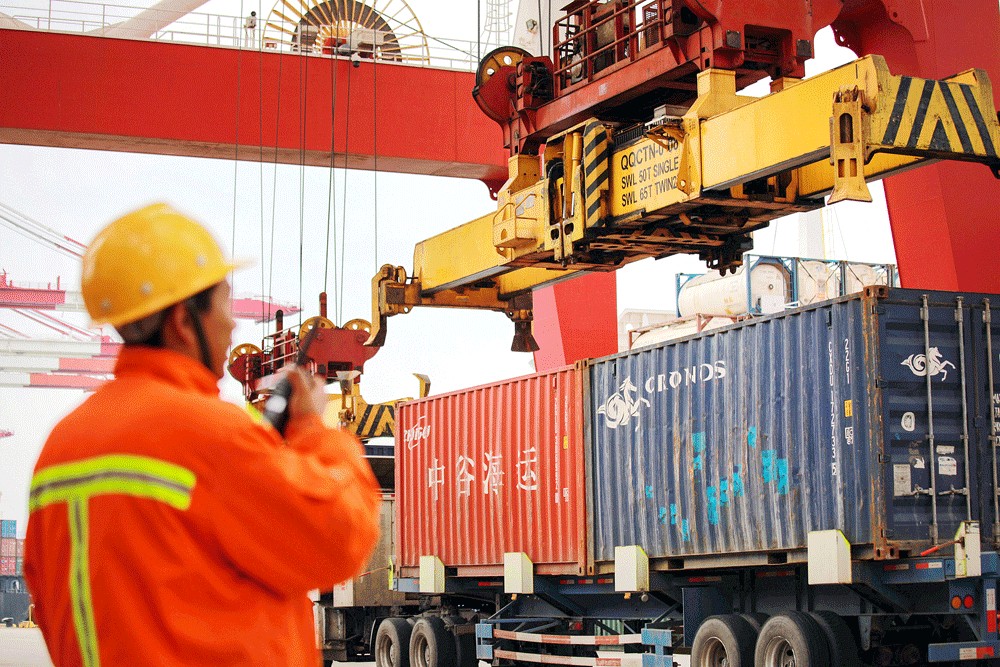Popular Reads
Top Results
Can't find what you're looking for?
View all search resultsPopular Reads
Top Results
Can't find what you're looking for?
View all search resultsIndonesia records $2.3b trade surplus in February despite coronavirus pandemic
The BPS recorded $1.98 billion imports from China, Indonesia’s largest trading partner, falling 35.27 percent in February compared with the same period last year.
Change text size
Gift Premium Articles
to Anyone
I
ndonesia recorded a US$2.34 billion trade surplus in February thanks to higher manufacturing exports despite disrupted trade activities with China as a result of the COVID-19 pandemic, Statistics Indonesia (BPS) announced on Monday.
The country recorded a total of $13.94 billion in exports in February, an 11 percent increase year-on-year (yoy), while total imports fell 5.11 percent yoy to $11.6 billion due to falling imports from China.
Indonesia's manufacturing exports recorded the largest growth, increasing 17.11 percent annually in February to $11.03 billion, while oil and gas exports slumped 26.51 percent to $820 million.
“The significant factor is rising exports to Singapore particularly of precious metals and jewelry,” BPS deputy for statistics distribution and services Yunita Rusanti said during an online press briefing.
Read also: Indonesia deploys second stimulus amid market, rupiah routs
“Exports to several other countries also surged significantly, such as palm oil exports to Ukraine and jewelry to Switzerland,” she added.
Meanwhile, falls in the country’s imports occurred among all types of products, namely consumer goods, raw materials and capital goods, amid a decline in shipments from China following the COVID-19 outbreak.
The most affected imported products were machinery and electrical appliances, mechanical appliances and plastic goods, said Yunita.
The BPS recorded $1.98 billion imports from China, Indonesia’s largest trading partner, falling 35.27 percent in February compared with the same period last year. Meanwhile, exports to China stood at $1.87 billion, up by 21.49 percent. Such a situation resulted in a trade deficit of $119 million with China, far lower than the $1.53 billion in February last year.
On that basis, Indonesia recorded a trade surplus of $1.7 billion during this year’s first two months compared with a deficit of $730 million booked in the same period last year.
Economists and businesspeople have raised concerns that the COVID-19 pandemic will hurt domestic industry as the virus outbreak has disrupted economic and business activities in countries around the world, including in economic giants the United States, China, Japan and Germany.
Read also: ‘We have many tanks to fill’: Indonesia to make the most out of globally low oil prices
The government announced on Friday that it was allocating Rp 120 trillion ($8.02 billion) from the state budget to stimulate the economy through tax incentives and subsidies for workers, businesses and families affected by the COVID-19 pandemic.
It also deployed a second stimulus package, worth Rp 22.9 trillion, that includes individual and corporate tax breaks as well as the relaxation of loan-disbursement and restructuring requirements, it also unveiled a non-fiscal stimulus package. The non-fiscal package includes a reduction in the number of prohibited imports, as well as an acceleration in export and import processing and licensing, especially for reputable traders.
Indonesia had announced 117 confirmed COVID-19 cases with five fatalities as of Sunday afternoon. Globally, the pneumonia-like illness has infected more than 169,000 people and taken at least 6,500 lives.










